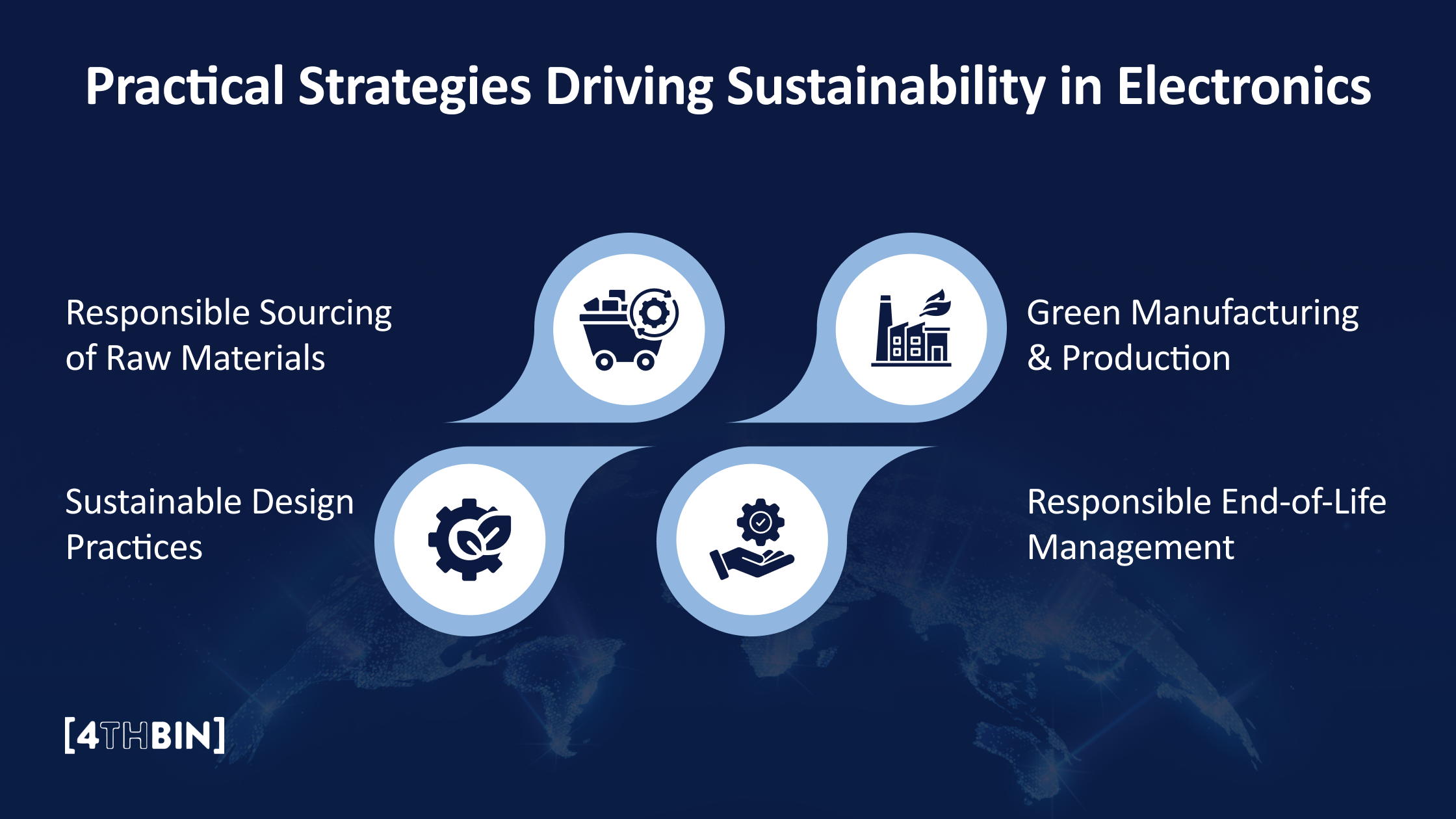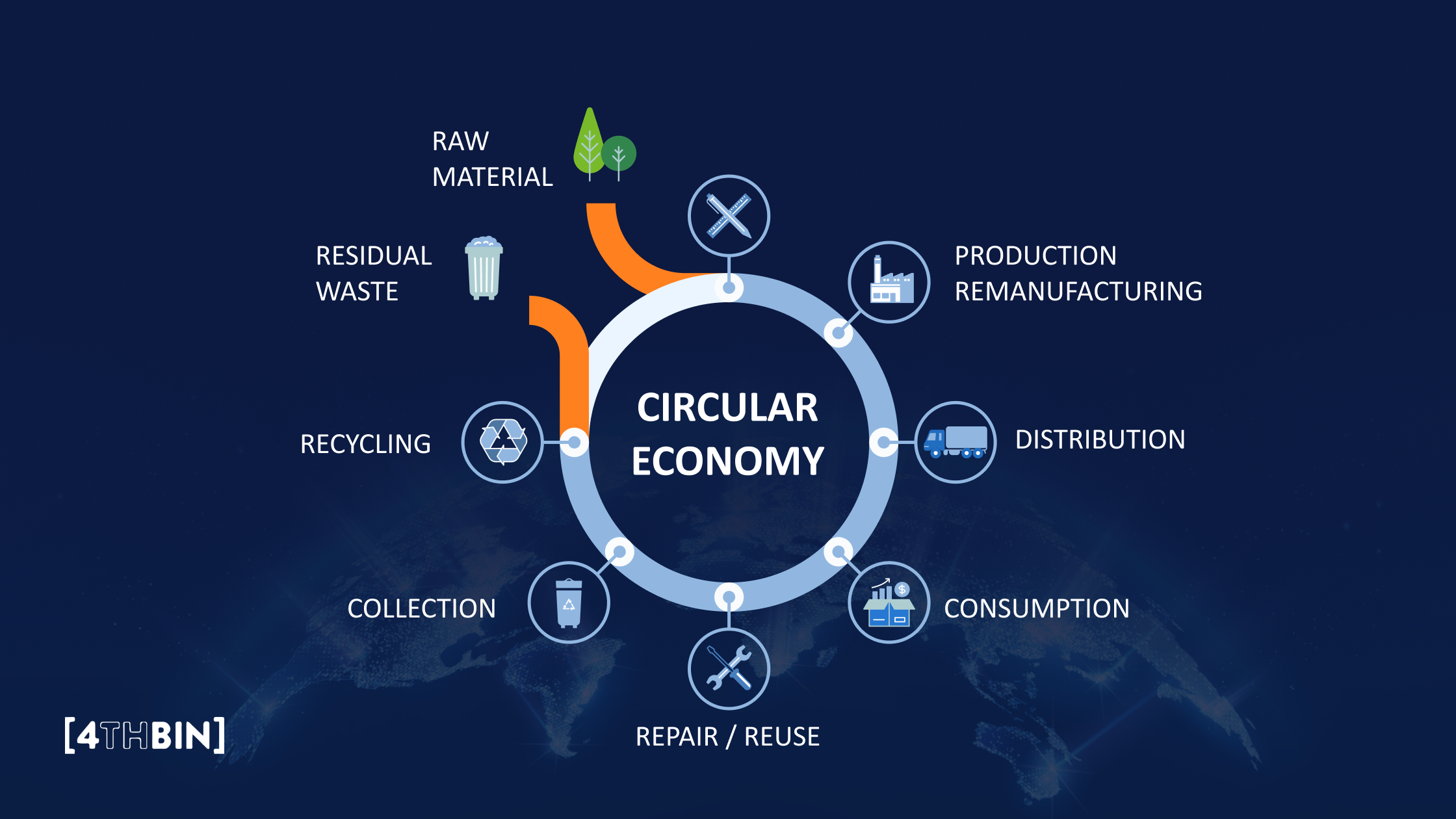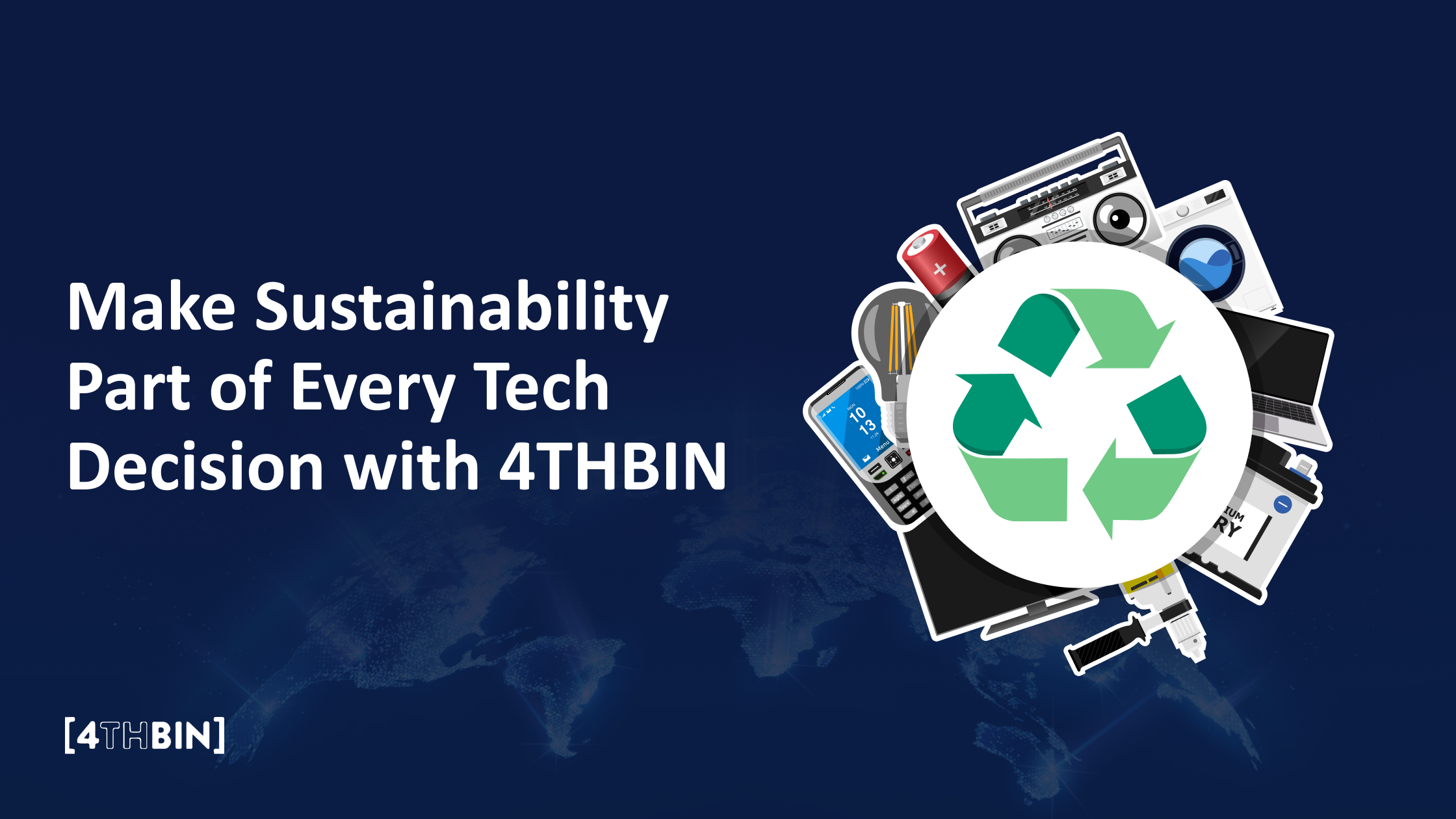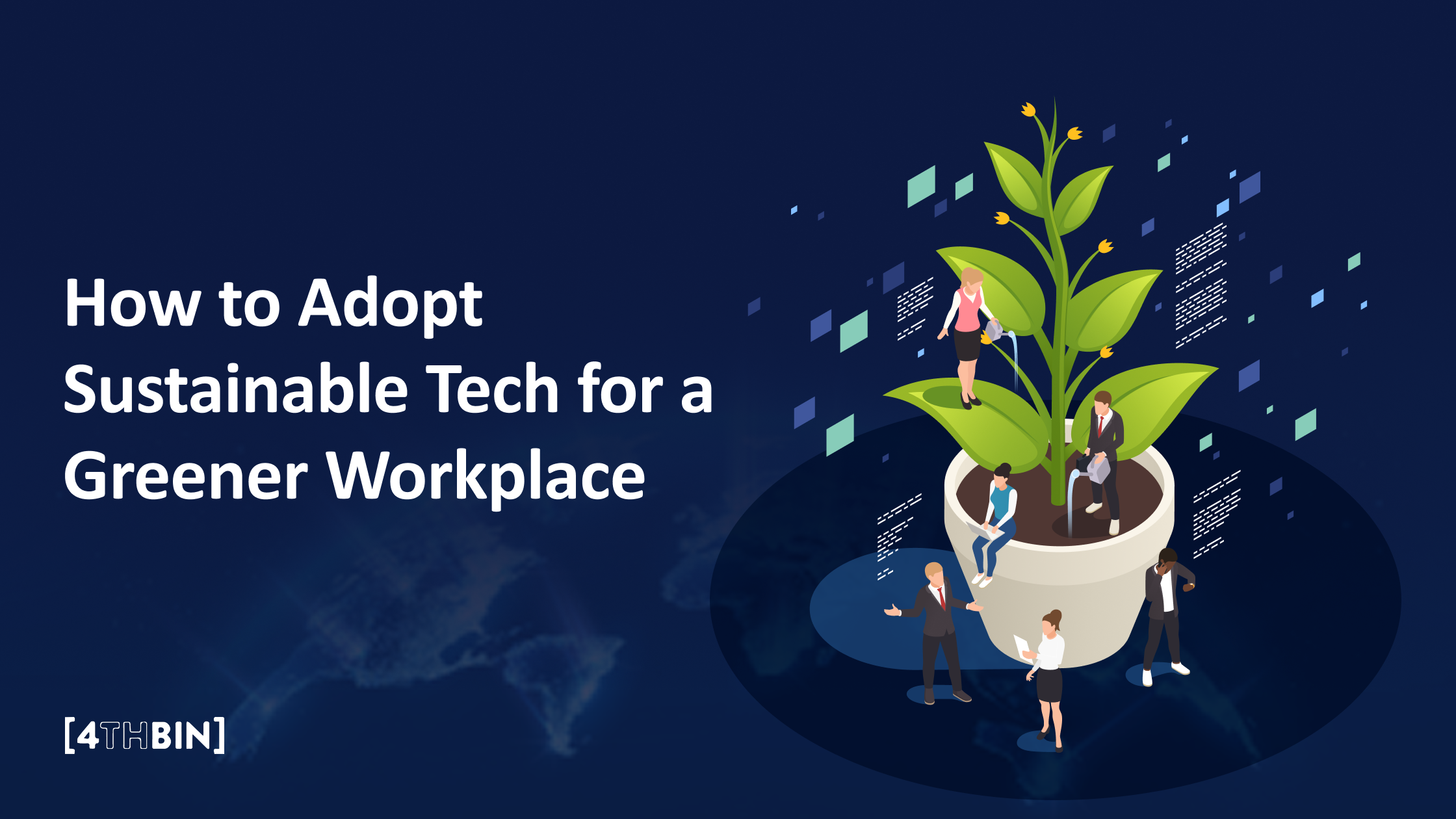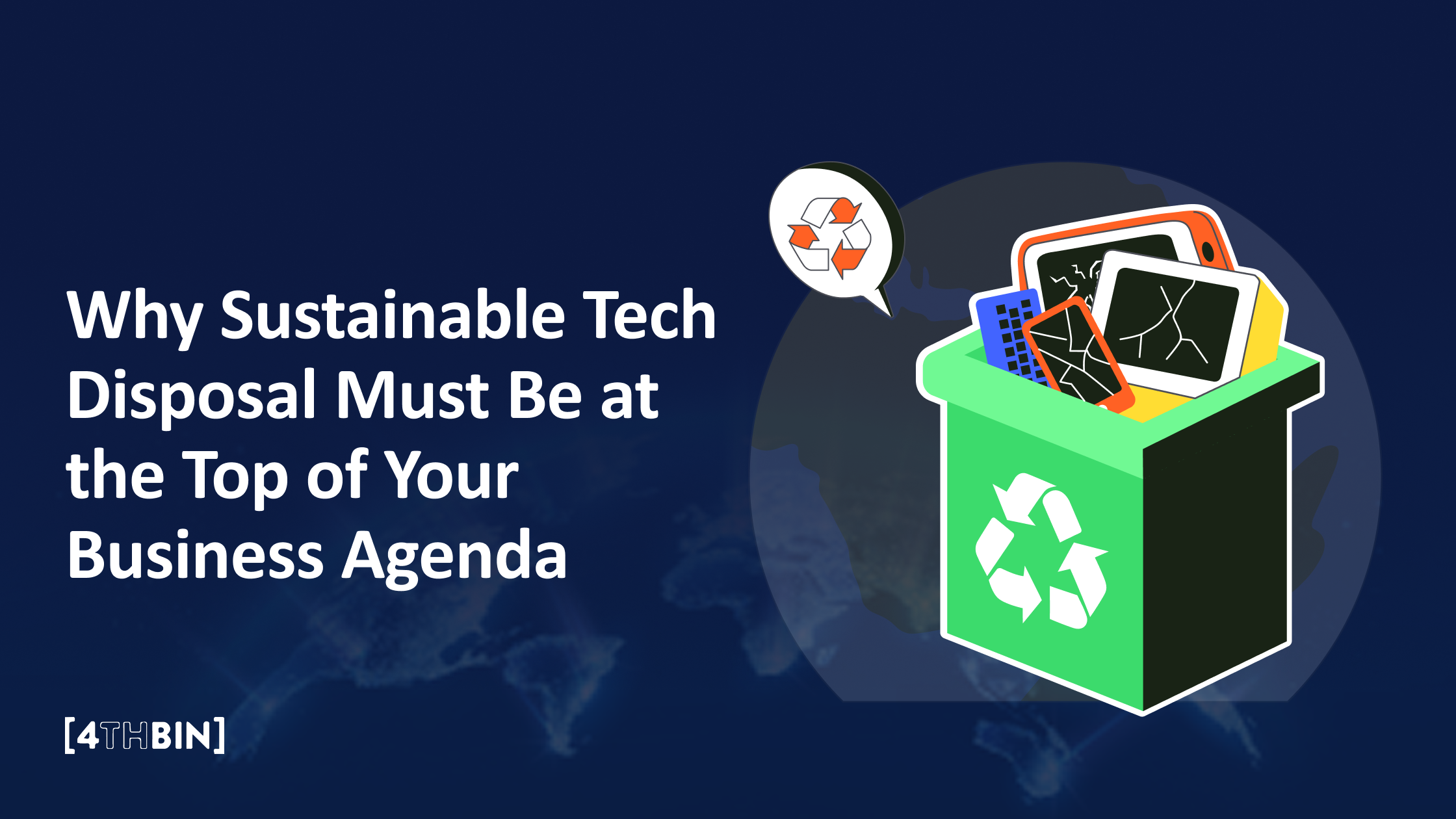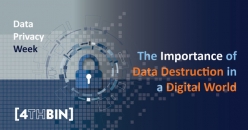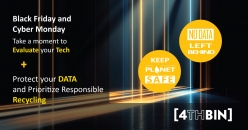Sustainability in Electronics: Powering a Responsible Future
We’re more connected than ever—at work, at school, and in our personal lives. Behind that connection is a vast network of electronic devices powering everything from critical infrastructure to everyday communication.
But while technology has transformed how we live and work, it’s also created one of the fastest-growing environmental challenges of our time.
The production, use, and disposal of electronics leave a significant environmental footprint. From resource extraction and energy use to rising levels of e-waste, the lifecycle of a single device leaves a bigger impact than most people realize.
And with shorter product lifespans and increasing demand, that impact is accelerating.
That’s why sustainability in electronics has become more than just a topic of conversation—it’s a strategic and ethical imperative. Whether you’re a business managing IT assets, a school upgrading digital infrastructure, or an individual replacing a device, every decision matters.
In this blog, we’ll break down what sustainability means in the context of electronics, identify the gaps that still exist, and show how organizations and individuals can take practical steps toward a more circular and responsible future.
The Growing Footprint of the Electronics Industry
There’s no denying the scale of our dependence on electronic devices. Whether you’re a global corporation running complex IT systems or a student attending virtual classes, electronics are woven into every part of daily life. But this convenience comes at a cost, and that cost is rising fast.
The electronics industry is one of the most resource-intensive sectors on the planet. Producing a single smartphone, for example, involves mining rare earth minerals, consuming vast amounts of water and energy, and emitting greenhouse gases through complex manufacturing processes. Multiply that by the billions of devices produced each year, and the impact is alarming.
What makes matters worse is how quickly electronics are replaced. Many devices are designed with short lifespans and limited repair options. Upgrades are marketed constantly. As a result, perfectly functional equipment is often retired early, and large quantities of electronics are discarded after just a few years of use.
This growing stream of waste has become one of the fastest-growing environmental challenges of our time.
For businesses and individuals alike, this isn’t just an environmental issue—it’s a call to rethink our approach to technology. If we want to power the future responsibly, we have to start by understanding the full cost of the devices we depend on.
What Sustainability Looks Like in the Electronics Sector
When people hear the word “sustainability” in the context of electronics, they often think about energy-efficient devices or recyclable packaging. But the reality is much more complex.
Sustainability in electronics means considering the full lifecycle of a product, from the raw materials used in its manufacture to its use and eventual disposal. It’s about understanding the environmental, social, and economic impact of each phase and making intentional choices that reduce harm at every step.
This includes where and how materials are sourced. Many of the metals used in electronics come from regions with severe environmental degradation or human rights concerns. True sustainability means ensuring that those materials are ethically mined, traceable, and sourced with minimal environmental impact.
It also includes the conditions under which devices are produced. Ethical labor practices, safe working conditions, and supply chain transparency all play a role in defining whether a product can truly be considered sustainable.
But sustainability doesn’t end at the point of sale. In fact, one of the most important—and most neglected—areas is what happens after the device is no longer in use. Whether it’s a smartphone, a printer, or a fleet of company laptops, how that tech is retired matters just as much as how it was made.
The companies leading the way in electronics sustainability are those that think holistically. They’re building repairable devices, reducing reliance on hazardous substances, investing in circular product design, and prioritizing certified end-of-life recycling. They’re not just aiming for energy savings; they seek to reduce impact across the board.
Practical Strategies Driving Sustainability in Electronics
While the challenges facing the electronics industry are significant, real and actionable strategies are being implemented to make progress. Here are a few sustainable strategies being implemented across the electronics industry:
Responsible Sourcing of Raw Materials
Sustainability begins long before a product is assembled. Many of the materials used in electronics, like cobalt, lithium, and gold, come from fragile ecosystems and regions with complex human rights issues.
Forward-thinking manufacturers are prioritizing transparency in their supply chains, working with suppliers that adhere to environmental standards and avoid conflict minerals. They’re also aligning with regulations like RoHS to ensure that harmful substances are phased out of production.
Equally important is the social responsibility tied to sourcing. Ethical labor practices, fair treatment of workers, and responsible community engagement are now crucial factors in measuring sustainability, especially as global scrutiny increases.
Sustainable Design Practices
Design decisions shape how long a device lasts, how easy it is to repair, and whether its components can be reused or recycled. More manufacturers are now adopting modular designs that support upgrades and extend the life of devices. Others are building products with disassembly in mind, making it easier to recover valuable materials later.
Energy efficiency is also being embedded at the design stage, with devices optimized for low power consumption from the start. Just as important is designing with the user in mind—creating clear instructions for maintenance and responsible use, which can significantly reduce early disposal.
Green Manufacturing & Production
Sustainable electronics also require cleaner production methods. Manufacturers are investing in energy-efficient facilities powered by renewables, reducing emissions and cutting back on water and material waste. Strategies like Material Flow Cost Accounting (MFCA) help track waste generation and pinpoint where resource use can be optimized throughout the manufacturing process. While some of these changes require upfront investment, they often lead to long-term savings, regulatory compliance, and increased stakeholder trust.
Responsible End-of-Life Management
The sustainability journey doesn’t end when a device leaves the production line. What happens after it’s used matters just as much. Leading electronics companies are expanding take-back programs, making it easier for consumers to recycle old devices properly.
Others are investing in refurbishment and re-commerce programs—giving used electronics a second life instead of sending them straight to the landfill. Some are even closing the loop completely through internal recycling systems that reintegrate recovered materials back into their production lines.
Consumer education is also part of the strategy. More brands are taking steps to explain how and where to recycle products responsibly, recognizing that behavior change is just as significant as infrastructure.
These strategies represent a meaningful shift toward more sustainable electronics. But even with this progress, there’s still a significant disconnect, especially when it comes to what happens after the devices leave the manufacturer’s hands.
Why End-of-Life Electronics Are a Blind Spot
Despite all the progress being made on the production side of electronics—from responsible sourcing to sustainable design—there’s one area where most sustainability strategies still fall apart: what happens when a device is no longer in use.
The end-of-life phase is often treated as an afterthought. Businesses stockpile old laptops and hard drives in storage closets. Schools hold onto outdated equipment because they don’t know what to do with it. And individuals toss used electronics into junk drawers—or worse, into the trash.
As a result, millions of devices end up in landfills or get shipped overseas without proper processing, contributing to toxic pollution and illegal dumping. Even worse, many of these discarded devices still contain sensitive data. For organizations handling financial, healthcare, or educational information, improper disposal isn’t just a sustainability issue; it’s a serious compliance and security risk.
What’s often missing is a clear plan and trusted partners. Businesses may be doing everything right on the procurement side, choosing energy-efficient and responsibly manufactured devices. But if they’re not managing how those assets are decommissioned and recycled, they’re leaving a massive gap in their sustainability story.
This is where working with certified e-waste recycling providers becomes critical. Companies like 4THBIN ensure that electronics are not only disposed of in an environmentally responsible way but also that they’re handled securely, with complete documentation for compliance and ESG reporting.
Sustainability can’t stop at purchase or usage. If we want to close the loop and truly reduce our impact, we need to think beyond the point of use and start treating end-of-life management as a core part of our technology strategy.
Why a Circular Approach is Vital for Sustainable Electronics
If we want electronics to be sustainable, we need more than responsible manufacturing and better disposal—we need a completely different way of thinking. That’s where the idea of a circular electronics economy comes in.
In a traditional, linear model, electronics follow a simple path: manufacture, use, discard. But in a circular model, we break that cycle. Instead of throwing devices away at the end of their useful life, we find ways to reuse, refurbish, and recover valuable materials. This keeps electronics—and the resources that power them—in circulation for as long as possible.
Circularity starts early, with design choices that make devices easier to upgrade, repair, or disassemble. But it only works if everyone in the chain participates. That includes manufacturers, of course, as well as businesses, institutions, schools, and individual consumers.
For organizations, embracing circular electronics means rethinking how devices are purchased, tracked, and decommissioned. It means looking at IT asset disposition not as a one-time event, but as part of a longer-term strategy—one that prioritizes secure recycling, refurbishment, and material recovery.
The benefits go well beyond sustainability. Circular practices can help businesses lower procurement and disposal costs, improve ESG ratings, and meet evolving compliance standards. For schools and nonprofits, extending the lifecycle of devices can free up limited budgets and reduce waste at the same time.
Circularity also unlocks new opportunities, such as re-commerce programs, tech donation initiatives, and internal reuse networks, that give electronics a second or even a third life.
At its core, the circular model asks a straightforward question: What if we treated technology not as disposable, but as a long-term resource?
Answering that question—through smarter systems, better partnerships, and shared responsibility—is how we start powering a more responsible future.
What Businesses, Institutions, and Individuals Can Do Now
Sustainability in electronics isn’t just the responsibility of manufacturers. It’s something we all have a role in—whether you're running a company, managing tech for a school, or just upgrading your phone at home. The good news is, you don’t need to overhaul everything to start making a difference. Small, intentional changes can have a significant impact when done consistently and at scale.
For Businesses and Organizations
Start by examining how you manage technology throughout its lifecycle. Are you tracking devices from procurement to disposal? Do you have a secure and certified partner handling your e-waste? Implementing internal processes for responsible tech disposal, alongside smarter procurement policies, can strengthen both your environmental impact and data protection strategies.
You can also train employees on device care, extend the use of hardware where possible, and integrate sustainability criteria into vendor selection. These steps aren’t just good for the planet—they also reduce costs and help meet ESG goals.
For Schools and Institutions
Budgets are often tight, but that makes sustainability even more important. Consider extending device lifespans through refurbishment programs or internal redeployment before purchasing new equipment. Work with certified recycling partners to responsibly dispose of aging tech and protect student data in the process.
You can also engage students and staff through collection drives, digital literacy sessions, or sustainability awareness campaigns. These initiatives not only reduce waste but foster a culture of shared responsibility.
For Individuals
While you may not control a full tech budget, your choices still matter. Look for devices built to last, choose repair over replacement when possible, and dispose of old electronics through verified recycling programs. Many manufacturers and retailers offer take-back options—use them.
And when it’s time to upgrade, consider donating functional devices or buying refurbished. Each of these choices extends the life of electronics and keeps valuable materials in use rather than in landfills.
No matter your role, the takeaway is simple: we all interact with electronics, and we all have a say in how sustainable they are. The shift won’t happen overnight, but the momentum starts with informed, everyday decisions.
Make Sustainability Part of Every Tech Decision with 4THBIN
Sustainability isn’t just a goal—it’s a practice. One that starts with the devices we already have. At 4THBIN, we help businesses, institutions, and individuals take real action toward sustainability through certified, secure, and environmentally responsible e-waste recycling.
With over a decade of experience, 4THBIN has partnered with more than 10,000 organizations, including Fortune 100 companies and small businesses, to transform e-waste challenges into opportunities. We make the process seamless, offering businesses a way to turn a potential liability into an opportunity for leadership in sustainability and responsibility.
Our certified data destruction services ensure that sensitive information is completely safeguarded, eliminating the risks of data recovery associated with improper disposal. From secure RemoteReturn mail-in options to convenient on-site collection, our customizable solutions allow you to choose the plan that best suits your organization’s needs.


